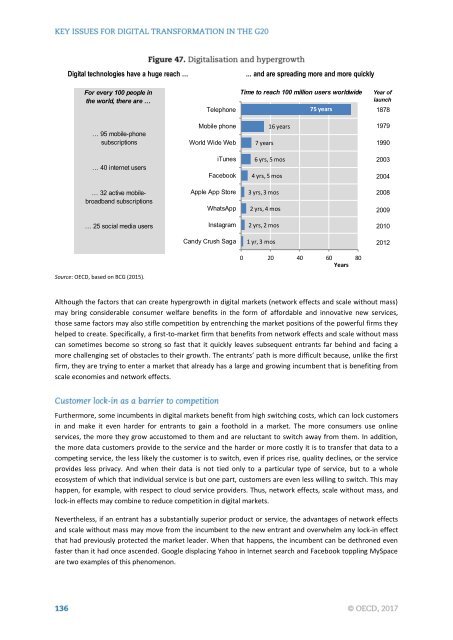KEY ISSUES FOR DIGITAL TRANSFORMATION IN THE G20
2jz0oUm
2jz0oUm
You also want an ePaper? Increase the reach of your titles
YUMPU automatically turns print PDFs into web optimized ePapers that Google loves.
Digital technologies have a huge reach …<br />
... and are spreading more and more quickly<br />
For every 100 people in<br />
the world, there are …<br />
Telephone<br />
Time to reach 100 million users worldwide<br />
75 years<br />
Year of<br />
launch<br />
1878<br />
… 95 mobile-phone<br />
subscriptions<br />
Mobile phone<br />
World Wide Web<br />
16 years<br />
7 years<br />
1979<br />
1990<br />
… 40 internet users<br />
iTunes<br />
Facebook<br />
6 yrs, 5 mos<br />
4 yrs, 5 mos<br />
2003<br />
2004<br />
… 32 active mobilebroadband<br />
subscriptions<br />
Apple App Store<br />
WhatsApp<br />
3 yrs, 3 mos<br />
2 yrs, 4 mos<br />
2008<br />
2009<br />
… 25 social media users<br />
Instagram<br />
2 yrs, 2 mos<br />
2010<br />
Candy Crush Saga<br />
1 yr, 3 mos<br />
2012<br />
0 20 40 60 80<br />
Years<br />
Source: OECD, based on BCG (2015).<br />
Although the factors that can create hypergrowth in digital markets (network effects and scale without mass)<br />
may bring considerable consumer welfare benefits in the form of affordable and innovative new services,<br />
those same factors may also stifle competition by entrenching the market positions of the powerful firms they<br />
helped to create. Specifically, a first-to-market firm that benefits from network effects and scale without mass<br />
can sometimes become so strong so fast that it quickly leaves subsequent entrants far behind and facing a<br />
more challenging set of obstacles to their growth. The entrants’ path is more difficult because, unlike the first<br />
firm, they are trying to enter a market that already has a large and growing incumbent that is benefiting from<br />
scale economies and network effects.<br />
Furthermore, some incumbents in digital markets benefit from high switching costs, which can lock customers<br />
in and make it even harder for entrants to gain a foothold in a market. The more consumers use online<br />
services, the more they grow accustomed to them and are reluctant to switch away from them. In addition,<br />
the more data customers provide to the service and the harder or more costly it is to transfer that data to a<br />
competing service, the less likely the customer is to switch, even if prices rise, quality declines, or the service<br />
provides less privacy. And when their data is not tied only to a particular type of service, but to a whole<br />
ecosystem of which that individual service is but one part, customers are even less willing to switch. This may<br />
happen, for example, with respect to cloud service providers. Thus, network effects, scale without mass, and<br />
lock-in effects may combine to reduce competition in digital markets.<br />
Nevertheless, if an entrant has a substantially superior product or service, the advantages of network effects<br />
and scale without mass may move from the incumbent to the new entrant and overwhelm any lock-in effect<br />
that had previously protected the market leader. When that happens, the incumbent can be dethroned even<br />
faster than it had once ascended. Google displacing Yahoo in Internet search and Facebook toppling MySpace<br />
are two examples of this phenomenon.


